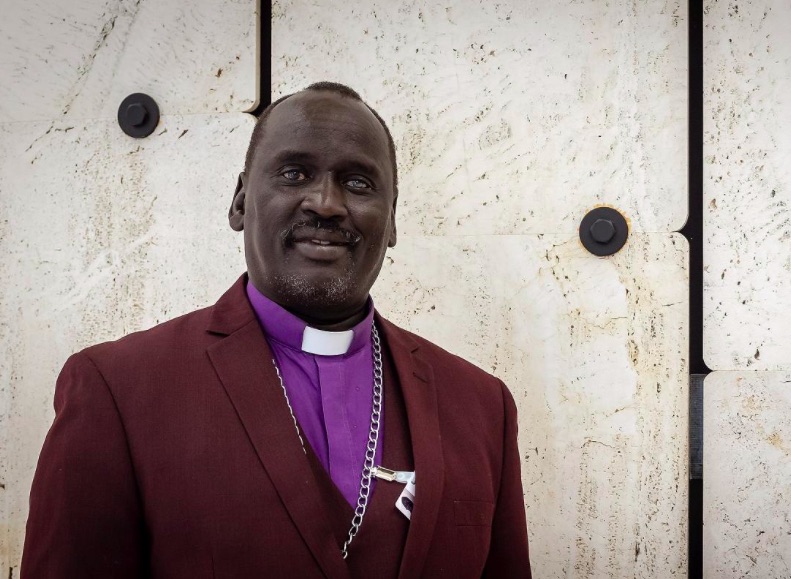TOLERANCE AND SOLIDARITY .
An article from the Lutheran World Federation
As politicians in South Sudan struggle to implement a lasting peace agreement, religious leaders are working hard at grassroots level to build a culture of peace and reconciliation between communities in conflict.
The Lutheran World Federation (LWF) has been accompanying South Sudanese through humanitarian work and supporting human rights and advocacy by churches there throughout the decades of conflict leading up to independence in 2011. Following an LWF-organized side event at the recent United Nations Human Rights Council in Geneva, South Sudan Council of Churches (SSCC) representative Bishop Isaiah Majok Dau spoke about how churches are spearheading dialogue in his country through what the Pentecostal Church leader describes as the “three pillars of peace”.

Bishop Isaiah Majok Dau, presiding bishop of the Sudan Pentecostal Church. Photo: LWF/A. Danielsson
Changing the narrative of violence
Advocacy, Bishop Dau said, is “the first pillar of peace” in his country, with the goal of “changing the narrative of violence” among communities, families and political leaders. That advocacy work includes the vital task of engaging on social media with South Sudanese living outside the country, many of whom use hate speech to promote their political ideas.
The second pillar of peace, Dau continued, is providing “a neutral forum” where opposition leaders, or others who cannot come to the capital Juba for security reasons, have an opportunity to speak and share their concerns. The church serves as “a bridge between them, wherever there is contention between the government and other communities,” he said, explaining how opposition leader Riek Machar was able to communicate through this forum with the government when he was in exiled in South Africa. The bishop said he recently held talks with opposition leaders in Juba and had just returned from the Ethiopian capital, Addis Ababa, where he met with opposition politician, Thomas Cirrillo in order to press for dialogue and reconciliation.
(Article continued in right column.)
Religion: a barrier or a way to peace?, What makes it one or the other?
Can peace be achieved in South Sudan?
(Article continued from left column.)
The third pillar, Dau said, “is called peace and reconciliation” promoting forgiveness among communities in South Sudan that have been fragmented by conflict. These concepts are not included in the peace agreement, he said, so “we, as a church, want to be a bridge to reconcile communities, to speak to hearts and to renew their faith in each other in dialogue.”
Learning “to talk, rather than take up guns”
The goal, he added, is “to create a culture of peace” so that people learn “to talk, rather than take up guns” and their disagreements over borders, land rights or cattle rustling are not resolved by resorting to violence. The framework that the SSCC has developed includes tools for trauma healing, economic empowerment and a correct use of resources, making it an invaluable asset for reaching out to the wider non-Christian community.
Questioned about how to make these tools available to remote grassroots communities, Dau said the church is present throughout the country and is “the only institution which can go where the government can’t go.” Even in “very rural areas like Jonglei State between the Murle and the Dinka” or between the “Turkana and the Karamojong in Uganda, we are the ones working through the grass roots on reconciliation,” he stressed.
“We base our message on hope,” the bishop concluded, telling people “the best is yet to come for South Sudan [so] don’t give up, because one day we will live in peace.” Quoting Jesus’ own message of peace from the New Testament, he said: “The gospel of hope is our biblical message and it comes out in all three pillars of peace.”
The Lutheran communion’s work among South Sudanese goes back to the 1980s. The LWF currently assists over 300,000 people inside the country and hundreds of thousands more who have sought refuge in neighboring Ethiopia, Kenya and Uganda. Capacity building in human rights and advocacy both at the local and international levels targets both government institutions and civil society organizations.
Bishop Isaiah Majok Dau was one of the panelists at a side event organized by the LWF during the 40th session of the UN Human Rights Council.